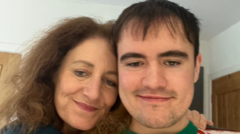Is Organ Donation Confusion Shaping a Man's Uncertain Future?

Published: 2025-09-23 13:00:17 | Category: wales
In the face of chronic kidney disease, a 24-year-old man is navigating an uncertain future as he awaits a kidney donor. Despite Wales leading the UK with its opt-out organ donation system, the ongoing shortage of suitable donors remains a distressing reality. This situation is exemplified by Dan, whose mother is passionately advocating for increased awareness and education surrounding organ donation to help secure a match for her son.
Last updated: 25 October 2023 (BST)
Key Takeaways
- Wales has an opt-out organ donation system, yet donor availability is low.
- Over 200 individuals have died waiting for organs in the last decade.
- Dan's health continues to deteriorate as he awaits a transplant.
- There is a significant gap in public understanding of organ donation laws.
- Community events aim to boost awareness and encourage registration.
The Organ Donation Landscape in Wales
Wales became the first region in the UK to implement an opt-out organ donation system in 2015. This legislation means that adults who have lived in Wales for over 12 months are automatically considered organ donors unless they explicitly opt out. However, despite this progressive step, the reality is that the number of available donors remains critically low.
As of now, more than 300 individuals are waiting for a kidney transplant in Wales. Tragically, over 200 people have died while on the waiting list in the past decade. These stark statistics raise urgent questions about the effectiveness of the current system and the need for greater public engagement and education on organ donation.
Understanding the Opt-Out System
The opt-out system in Wales allows residents to be considered organ donors unless they choose to opt out. However, the law does not eliminate the family's ability to refuse donation if the deceased did not express their wishes clearly. This creates a paradox where many families might still decline donation due to uncertainty or lack of communication about their loved one's choices.
Misconceptions and Their Consequences
Many people mistakenly believe that the opt-out system guarantees donation, leading to a false sense of security. According to Charlotte Charles-Williams, a lead organ donation nurse for South Wales, only about 50% of families support organ donation after death. The uncertainty surrounding the deceased's wishes plays a critical role in these decisions.
Dan's Journey: A Personal Story
Dan's battle with chronic kidney disease began after he contracted meningitis in 2020. The infection caused significant complications, including the need for a muscle transfer in his right arm and ankle fusion surgery. Despite these challenges, his mother Carolyn Thomas describes him as "the most amazing person you'll ever meet," highlighting his resilience and determination.
At just 24 years old, Dan's kidney filtration rate is alarmingly low at 20, with anything below 18 considered critical. His consultant has indicated the urgent need for a transplant before dialysis becomes necessary. Long-term dialysis can lead to poorer health outcomes, making the quest for a living donor even more crucial.
The Search for a Match
Dan's family and friends have undergone testing in hopes of finding a suitable match, but so far, no one has qualified. Carolyn emphasises the importance of live donations for someone Dan's age, as they typically yield the best outcomes. However, she acknowledges that potential donors are "very few and far between."
It's vital to understand that many individuals are unaware that one can lead a normal life with just one kidney. This lack of knowledge may be contributing to the reluctance to consider live organ donation. Carolyn is committed to spreading awareness and hopes that more people will consider joining the organ donor register or even becoming live donors.
The Role of Community in Raising Awareness
To further promote understanding and engagement with organ donation, Carolyn is organising a community event at Garth Hill in Efail Isaf. Here, attendees will light up the hill in pink and form a "jumping heart" to symbolise the importance of organ donation. She believes that such events can spark conversations and encourage individuals to discuss their wishes with loved ones.
Importance of Communication
Charlotte Charles-Williams emphasises that discussing one’s organ donation wishes with family is crucial. When families are aware of their loved one's wishes, they are more likely to support organ donation after death. The uncertainty faced by families can lead to missed opportunities, and ensuring open communication can help save lives.
How to Become an Organ Donor
For those wishing to register as organ donors, the process is straightforward. Interested individuals can register online or by calling 0300 1232323. However, the most important step remains the conversation with loved ones about one’s wishes regarding organ donation.
Why Live Donation Matters
Live organ donation is often the best option for recipients, particularly for kidneys. Carolyn's advocacy highlights the misconception that living donation is too risky or complicated. In reality, many donors lead healthy, normal lives post-donation.
Conclusion: A Call to Action
The story of Dan and his family's struggle underscores the pressing need for greater awareness and understanding of organ donation in Wales. As more individuals become informed about the realities of organ donation and the opt-out system, the hope is that more people will choose to register and discuss their wishes with family members. Organ donation can indeed be the greatest gift someone can ever give—one that can change lives forever.
As communities come together to support causes like Dan's, we must ask ourselves: How can we contribute to raising awareness about the life-saving impact of organ donation? #OrganDonation #KidneyTransplant #WalesHealth
FAQs
What is the opt-out organ donation system in Wales?
The opt-out organ donation system in Wales automatically considers adults who have lived in the country for over 12 months as organ donors unless they choose to opt out. This system aims to increase the number of available organs for transplant.
How can I register as an organ donor in Wales?
To register as an organ donor in Wales, you can do so online or by calling 0300 1232323. It is essential to also communicate your wishes with your family to ensure they are aware of your decision.
What challenges do families face regarding organ donation?
Families often face uncertainty about their loved one's wishes, leading to reluctance in supporting organ donation. Clear communication about one's intentions can help alleviate this uncertainty and increase the likelihood of support for donation.
Why is live kidney donation important?
Live kidney donation is important because it typically offers better outcomes for the recipient compared to deceased donor kidneys. Many individuals can lead normal lives with just one kidney, making live donation a viable option for many potential donors.
What can be done to increase awareness about organ donation?
Increasing awareness about organ donation can be achieved through community events, educational campaigns, and open conversations within families. Sharing personal stories and experiences can also encourage others to consider registering as donors.



